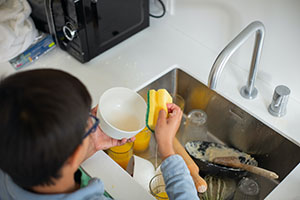
Getting children involved in household chores is not always an easy task. Many parents face resistance, complaints, and even drama when trying to engage their children in these responsibilities. However, it is possible to make the process of involving your child in household chores a drama-free and positive experience.
Teaching children the importance of responsibility and contributing to the household is a valuable life lesson. Engaging them in household chores not only lightens the workload for parents but also fosters essential skills, including teamwork, discipline, and accountability.
Strategies to Encourage Participation
By implementing a few strategies and fostering a supportive environment, you can encourage your child to willingly participate in chores without unnecessary conflicts or drama.
Explain the Importance of Helping
Take the time to have an age-appropriate conversation with your child about the importance of household chores. Explain that these tasks contribute to maintaining a clean and organized home, and that everyone in the family has a role to play. Emphasize the concept of teamwork and how their contributions make a difference. When children understand the purpose and significance behind the chores, they are more likely to approach them with a positive mindset.
Lead by Example

Children often look up to their parents as role models. By demonstrating a positive attitude towards household chores and actively participating in them, you set a powerful example for your child to follow.
Engage in tasks with enthusiasm and showcase the satisfaction that comes from completing them. When children see their parents taking responsibility for household chores, they are more likely to adopt a similar approach.
Make Chores Age-Appropriate

Assigning age-appropriate tasks is essential for ensuring your child’s success and maintaining their interest in household chores. Tailor the responsibilities to their abilities, gradually increasing the complexity as they grow older.
For younger children, simple tasks like setting the table or putting away toys are achievable, while older children can take on more substantial tasks such as folding laundry, helping with meal preparation or washing the dishes. Adapting chores to their capabilities boosts their confidence and motivation to contribute.
Create a Chore Chart
Visual aids, such as chore charts or checklists, can be effective tools for organizing and tracking chores. Involve your child in creating the chart, allowing them to choose the tasks they feel comfortable with. Display the chart in a prominent place, like the refrigerator, and use colorful stickers or markers to mark completed tasks. The visual representation of progress provides a sense of accomplishment and encourages a sense of responsibility.
Make it a Positive Experience
Create a positive and supportive atmosphere around chores. Instead of approaching chores with a stern or disciplinary tone, infuse them with positivity. Use encouraging language, provide assistance when necessary, and focus on the progress made rather than pointing out mistakes. Celebrate achievements, even small ones, to reinforce their sense of accomplishment and make the experience enjoyable.
Establish Consistent Routines
Consistency is key when it comes to integrating chores into your child’s routine. Set a regular schedule for completing tasks, ensuring they are aware of the specific expectations. Consistency helps children understand that chores are a normal part of daily life and reinforces the habit of contributing to the household. Over time, it becomes a natural and expected part of their responsibilities.
Make Chores Fun
Incorporating an element of fun can transform mundane chores into enjoyable activities. Turn on their favorite music or create a family playlist that energizes and motivates everyone while working. You can also turn chores into friendly competitions or challenges, setting goals and offering small rewards or incentives for their accomplishments. Adding an element of playfulness makes the tasks more engaging and encourages participation.
Express Appreciation

Recognizing and appreciating your child’s efforts and contributions can significantly boost their motivation. Offer praise and positive reinforcement for their hard work, emphasizing how their contributions benefit the family as a whole.
Simple gestures like a high-five, a verbal “thank you,” or a special treat can go a long way in reinforcing their sense of accomplishment and encouraging continued participation. You can also motivate your child by offering rewards or incentives for completing chores.
Engaging your child in household chores can be a drama-free and positive experience with the right strategies. By implementing these strategies, you not only teach your child valuable life skills but also foster a sense of responsibility and contribute to their personal growth.

One crucial aspect of engaging your child in household chores is to maintain open and age-appropriate communication. Take the time to explain the importance of each chore and how it contributes to the overall functioning of the household.
Help your child understand that their participation is not just about completing tasks, but also about being an active member of the family team.
Conclusion
Encouraging your child to participate in household chores is an investment in their personal growth and development. By leading by example, providing age-appropriate tasks, creating chore charts, establishing consistent routines, infusing fun, and expressing appreciation, you can foster a positive attitude towards household responsibilities.
Remember that patience and understanding are essential during this process. As your child becomes more involved in household chores, they will develop valuable life skills, learn the importance of teamwork, and experience a sense of pride in their contributions to the family unit.

Leave a Reply